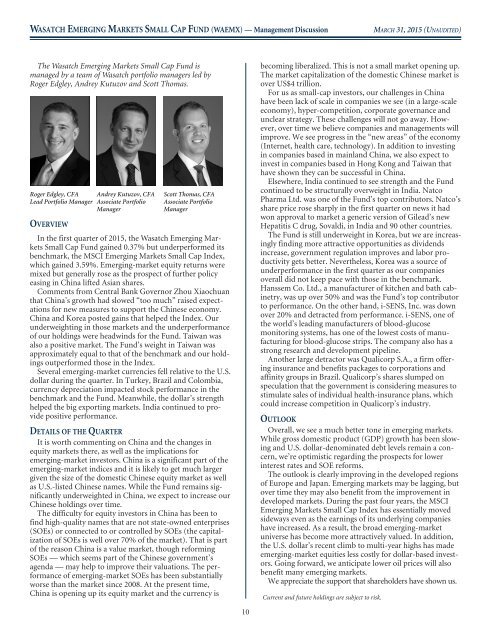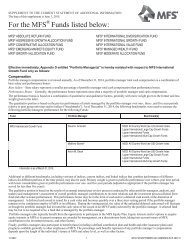WASATCH FUNDS - Curian Clearing
WASATCH FUNDS - Curian Clearing
WASATCH FUNDS - Curian Clearing
You also want an ePaper? Increase the reach of your titles
YUMPU automatically turns print PDFs into web optimized ePapers that Google loves.
<strong>WASATCH</strong> EMERGING MARKETS SMALL CAP FUND (WAEMX) — Management Discussion<br />
MARCH 31, 2015 (UNAUDITED)<br />
The Wasatch Emerging Markets Small Cap Fund is<br />
managed by a team of Wasatch portfolio managers led by<br />
Roger Edgley, Andrey Kutuzov and Scott Thomas.<br />
Roger Edgley, CFA<br />
Lead Portfolio Manager<br />
OVERVIEW<br />
Andrey Kutuzov, CFA<br />
Associate Portfolio<br />
Manager<br />
Scott Thomas, CFA<br />
Associate Portfolio<br />
Manager<br />
In the first quarter of 2015, the Wasatch Emerging Markets<br />
Small Cap Fund gained 0.37% but underperformed its<br />
benchmark, the MSCI Emerging Markets Small Cap Index,<br />
which gained 3.59%. Emerging-market equity returns were<br />
mixed but generally rose as the prospect of further policy<br />
easing in China lifted Asian shares.<br />
Comments from Central Bank Governor Zhou Xiaochuan<br />
that China’s growth had slowed “too much” raised expectations<br />
for new measures to support the Chinese economy.<br />
China and Korea posted gains that helped the Index. Our<br />
underweighting in those markets and the underperformance<br />
of our holdings were headwinds for the Fund. Taiwan was<br />
also a positive market. The Fund’s weight in Taiwan was<br />
approximately equal to that of the benchmark and our holdings<br />
outperformed those in the Index.<br />
Several emerging-market currencies fell relative to the U.S.<br />
dollar during the quarter. In Turkey, Brazil and Colombia,<br />
currency depreciation impacted stock performance in the<br />
benchmark and the Fund. Meanwhile, the dollar’s strength<br />
helped the big exporting markets. India continued to provide<br />
positive performance.<br />
DETAILS OF THE QUARTER<br />
It is worth commenting on China and the changes in<br />
equity markets there, as well as the implications for<br />
emerging-market investors. China is a significant part of the<br />
emerging-market indices and it is likely to get much larger<br />
given the size of the domestic Chinese equity market as well<br />
as U.S.-listed Chinese names. While the Fund remains significantly<br />
underweighted in China, we expect to increase our<br />
Chinese holdings over time.<br />
The difficulty for equity investors in China has been to<br />
find high-quality names that are not state-owned enterprises<br />
(SOEs) or connected to or controlled by SOEs (the capitalization<br />
of SOEs is well over 70% of the market). That is part<br />
of the reason China is a value market, though reforming<br />
SOEs — which seems part of the Chinese government’s<br />
agenda — may help to improve their valuations. The performance<br />
of emerging-market SOEs has been substantially<br />
worse than the market since 2008. At the present time,<br />
China is opening up its equity market and the currency is<br />
becoming liberalized. This is not a small market opening up.<br />
The market capitalization of the domestic Chinese market is<br />
over US$4 trillion.<br />
For us as small-cap investors, our challenges in China<br />
have been lack of scale in companies we see (in a large-scale<br />
economy), hyper-competition, corporate governance and<br />
unclear strategy. These challenges will not go away. However,<br />
over time we believe companies and managements will<br />
improve. We see progress in the “new areas” of the economy<br />
(Internet, health care, technology). In addition to investing<br />
in companies based in mainland China, we also expect to<br />
invest in companies based in Hong Kong and Taiwan that<br />
have shown they can be successful in China.<br />
Elsewhere, India continued to see strength and the Fund<br />
continued to be structurally overweight in India. Natco<br />
Pharma Ltd. was one of the Fund’s top contributors. Natco’s<br />
share price rose sharply in the first quarter on news it had<br />
won approval to market a generic version of Gilead’s new<br />
Hepatitis C drug, Sovaldi, in India and 90 other countries.<br />
The Fund is still underweight in Korea, but we are increasingly<br />
finding more attractive opportunities as dividends<br />
increase, government regulation improves and labor productivity<br />
gets better. Nevertheless, Korea was a source of<br />
underperformance in the first quarter as our companies<br />
overall did not keep pace with those in the benchmark.<br />
Hanssem Co. Ltd., a manufacturer of kitchen and bath cabinetry,<br />
was up over 50% and was the Fund’s top contributor<br />
to performance. On the other hand, i-SENS, Inc. was down<br />
over 20% and detracted from performance. i-SENS, one of<br />
the world’s leading manufacturers of blood-glucose<br />
monitoring systems, has one of the lowest costs of manufacturing<br />
for blood-glucose strips. The company also has a<br />
strong research and development pipeline.<br />
Another large detractor was Qualicorp S.A., a firm offering<br />
insurance and benefits packages to corporations and<br />
affinity groups in Brazil. Qualicorp’s shares slumped on<br />
speculation that the government is considering measures to<br />
stimulate sales of individual health-insurance plans, which<br />
could increase competition in Qualicorp’s industry.<br />
OUTLOOK<br />
Overall, we see a much better tone in emerging markets.<br />
While gross domestic product (GDP) growth has been slowing<br />
and U.S. dollar-denominated debt levels remain a concern,<br />
we’re optimistic regarding the prospects for lower<br />
interest rates and SOE reforms.<br />
The outlook is clearly improving in the developed regions<br />
of Europe and Japan. Emerging markets may be lagging, but<br />
over time they may also benefit from the improvement in<br />
developed markets. During the past four years, the MSCI<br />
Emerging Markets Small Cap Index has essentially moved<br />
sideways even as the earnings of its underlying companies<br />
have increased. As a result, the broad emerging-market<br />
universe has become more attractively valued. In addition,<br />
the U.S. dollar’s recent climb to multi-year highs has made<br />
emerging-market equities less costly for dollar-based investors.<br />
Going forward, we anticipate lower oil prices will also<br />
benefit many emerging markets.<br />
We appreciate the support that shareholders have shown us.<br />
Current and future holdings are subject to risk.<br />
10




